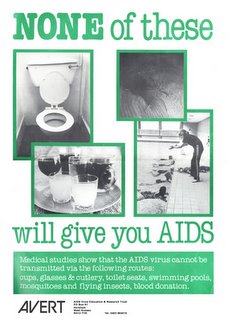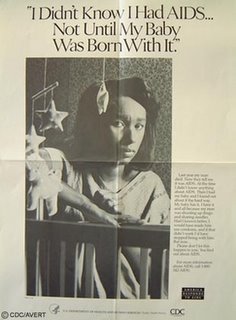In an article from the Toronto Star published on August 15th, 2006, the input of actor Richard Gere and MTV executive William Roedy were use to discuss the role of the media. Specifically, the focus was on outlets outside of the typical hard news formats, and the role that they can play in reversing the spread of the disease. The following is an excerpt from that article:
He spoke of his work with the Indian and Russian media, following the launch of the Global Media Initiative in 2004 by UN Secretary General Kofi Annan, along with the Kaiser Family Foundation and UNAIDS.
"Seasoned CEOs and owners came together and they brought cultural icons to power it," Gere said. He told how the Indian media created public service advertisements targeted at specific audiences: families, youth, high and low income. Messages were incorporated into game shows and embedded into plotlines of television shows.
"If it's done with good actors, high-quality production, then you humanize it. This is something I deeply believe in," said Gere, mentioning an award-winning medical show on Star India that incorporated the story of an HIV-positive patient.
William Roedy, president of MTV Networks International and chair of the Global Media AIDS Initiative, moderated the special session. "Media has such a huge role to play and being in it, I can say we're not doing enough," said Roedy. "Media can be a force for good."
In an article from the Toronto Sun from the same date, Bill Clinton echoed that very sentiment when he was quoted as saying, "We need to find (HIV-positive) people who are recognized and respected and have them help us fight the stigma,".
The article then moved from Bill Clinton to Bill Gates who was quoted as offering a few critical observations, which accentuate the importance of creatively using various forms of media in order to combat the stigma that is attached to HIV/AIDS.

While such brush strokes are problematic, Gates was paraphrased as pointing out, “that many rich countries have started to turn the corner, but the stigma is still a major problem in poor counties”.
Moving beyond a rich/poor stereotype, one can say that regions where far-reaching campaigns have been undertaken to eliminate the stigma that is attached to having the infection have seen progress, whereas, regions without such projects see complex consequences to the stigma. While these campaigns require funding, they don't always take place in "rich countries".
Such consequences being low testing rates, leading to minimal awareness of infection which facilitates the continued spread. Such a circumstance leads to a false sense of how common infection is and the degree of the potential risk, and the possible treatments available are not accessed.

From my personal experience, I would counter the assumption of “rich” countries having a less of a stigma in dealing with those infected, in contrast to “poor” countries. In Tamale, Ghana, a region in the midst of an attempt to catch up to the level of development that many of the major urban centres in the southern part of the country have seen, the message of “show compassion to those living with HIV/AIDS” has infiltrated the minds of a lot of people. While not everyone lives up to those words, the consciousness is there, and there seems to be a common understanding that “showing compassion” is the right thing to do; whether or not people do it, is another story complicated by the fact that barely anyone knows anyone that has HIV/AIDS or if they themselves have it.
On the other side of that coin, I can say that I had never heard the importance of “showing compassion” to people who have tested positive before I came to Ghana. The message of staying protected was certainly hit home while in Toronto, yet I would suggest that the stigma attached to testing positive would be substantial in the majority of Canadian communities.

Globally eroding the stigma of infection is vital. The consequences are not only serious, but they are also peculiar. Again, in the Toronto Sun, Bill Gates was quoted as saying that, "We have a rocky road until we develop a vaccine or a cure ... 90% of HIV-positive people don't know it. We won't catch up until people are aware they could be giving the virus to others." People don’t know because people don’t talk about it. Most of us can not say many (if any) people that we know of that are infected. If we could actually be shown through an omniscient view of the world how many people we come in contact with that have been infected, I am sure that we would be shocked.
The combined factors of the fatal effect of the virus, the possibility of transmission through various forms of human contact, the void of a cure, and the primary vehicles of transmission being through sex and drug use, HIV/AIDS stands in a category of its own in terms of diseases. As a result, silence and secretiveness impede the possibility of stopping the spread.
When infected with malaria or affected by cancer, people rely on the support of the family, friends, their community, the state, and the medical profession to do everything possible to help them. Such is not the case with HIV/AIDS.
Though the silence is a major problem, when we think of the disease from a self-centred viewpoint, silence makes sense. Think about it:
‘Why would I want people to know that I am infected?’
‘Why would I put myself through the rejection, and the undue challenges that I would have to face?’
‘With being infected, I have enough to deal with already, why add more of a burden to my life?’.
Would you really want people to be afraid of having physical contact with you? Even to go to some ones house for dinner and to have them feel that they have to pour bleach on the utensils that you have used, people being afraid to go in a swimming pool with you, and the assumption that you, if not married, will be single and alone for the rest of your life are just some of the hurtful bumps along the road for someone who is open about being infected
.
From a short term, self-centred view of the HIV/AIDS issue, silence is only logical. However, if we look at the epidemic with the long term vision of eliminating from the face of the planet, and we look at the hardships that our generation must endure to relieve future generations of even heavier consequences, then silence becomes one of the greatest threats to progress.

In order to break the silence, there needs to be cooperation on a grand-scale between all segments of the globally community. It is an issue for those who have not been infected as much as it is for those who have been infected. It is an issue for nations with relatively small segments of their population at risk, as much as it is an issue for nations that are being crippled by the virus.
In order for those who have not been infected to stay as safe as possible, they have to know the real scale of the epidemic. In order for those infected to break the silence, they have to know that they are safe to do so. While the distribution of the virus at this current point in time is disproportionately high where factors such as poverty are rampant, AIDS does not respect nationality, ethnicity, class, sexuality or gender. Those aspects might make your chances higher, but it only takes one exposure. Read personal testimonies and the most common words among those infected - both those that are still alive and those that have passed on - is "I never thought it would/could be me".
There is no one who is to sit outside of the house on this matter. There is no one who does not have a role to play. As long as we continue to assume that this is an issue for someone else in some other part of the city we live in, or another part of the country we live in, or in some other part of the world that that we live in, this scourge will continue to advance.
It is the interconnectedness of human-kind that makes us all vulnerable, yet it is the same interconnectedness that offers us our greatest chance in eliminating this virus.
It is our role to be educated on the disease, and to commit to a lifestyle that eliminates the possibility of transmission: getting tested, staying protected, being honest, and demanding sanitized medical equipment. Additionally, we need to develop a global culture where people are loved and supported, so that the enemy of silence can be disarmed.
I will add that there are major tragedies and widespread systems of injustice in our past that we can look at now and see with disgust and disdain. Many of us look at parts of human history and ask “how could people do that?” and we ask “how could people stand by and let that happen”. Let that not be said of us when future generations look at the history or our time.

In closing, I will echo a suggestion made by Bill Gates, that if we overcome this disease, the momentum of our cooperative abilities could snowball into other major plagues facing humanity such as malaria, malnutrition, and poverty to name a few. While we deal with the physical and psychological attacks of war across the globe, let us imagine and activate global cooperation with the same degree of zeal and passion. We can topple HIV/AIDS the way we do cities and nations...
No comments:
Post a Comment